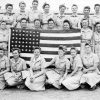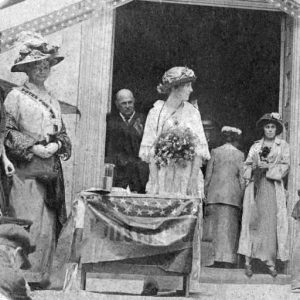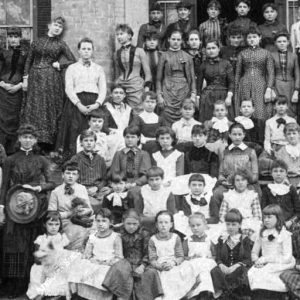calsfoundation@cals.org
Julia McAlmont Warner (1860–1927)
Julia McAlmont Warner was an educator at Arkansas Female College in Little Rock (Pulaski County) and a leader of the Political Equality League, a women’s suffrage organization in Arkansas.
Julia McAlmont Warner was born on September 1, 1860, in Hornell, New York, to Truman Warner and Myra Cordelia McAlmont Warner, both natives of New York. Her mother established the Arkansas Female College in 1872 and was an early supporter of women’s suffrage in Arkansas. In 1877, Julia McAlmont Warner began her career teaching at the Arkansas Female College at the age of seventeen and continued there for several years. She was fluent in several languages, including Latin, French, Spanish, and Italian.
In 1911, a number of prominent women in the social and political spheres, including Warner, gathered at a seminal public meeting to discuss the demand for women’s suffrage in Arkansas. An article that had appeared on the front page of the Arkansas Gazette in reply to a scathing criticism of women written in another newspaper demanded that suffrage be granted to women. The women at the meeting discussed not only this article but also women’s suffrage in Arkansas in general. After the public meeting, the group of women requested a hearing with the Arkansas Judiciary Committee in early 1911 on the same topics as the public meeting: women’s suffrage and women’s political rights in Arkansas. This hearing request was later approved and subsequently was responsible for helping form the Woman’s Political Equality League (also known simply as the Political Equality League). Warner served as the first chairman and the first treasurer of the league at its inaugural meeting in 1911 in Arkansas.
It was at this same time, in 1911, that equal suffrage resolutions were being introduced in the Arkansas House of Representatives by Representatives George Grant of Newport (Jackson County) and George Whittington of Hot Springs (Garland County). However, these introductions were rumored to be a joke and were not taken seriously. When it became known that this bill was introduced and not further acted upon because of the assumption that it could not be serious, women suffragists in Arkansas appealed to Representative George Hearst of Fayetteville (Washington County), chairman of the Judiciary Committee, for a hearing on the same bill. Warner was at the forefront of this. The women were finally granted a hearing on March 15, 1911, for their introduced bill. The committee met at the Marion Hotel, and a full hearing was granted at that time; women of the committee gave speeches for suffrage, and later the House received a report of the suffrage resolution. Six members voted for the resolution.
Under the auspices of the Woman’s Political Equality League, the first National Suffrage May Day was observed in October 1914 on the front steps of what later became the Old State House in Little Rock. At this rally, Warner was invited to give a speech asking for the right of suffrage for Arkansas women, alongside several other prominent suffragists and community figures, both women and men.
Warner, as well as several members of her family, was also very active in other social and cultural groups and associations. She was the co-founder of the Mayflower Society and the Alliance Française. She also served as a charter member for the Daughters of the American Revolution and was a member of the Colonial Dames. Her uncle, Dr. John Josephus McAlmont, was a well-known doctor and co-founder of Arkansas Industrial University’s Medical Department, which later became the University of Arkansas for Medical Sciences.
Warner died at her home near Little Rock on December 30, 1927. She is buried in Mount Holly Cemetery.
For additional information:
Arkansas Female College Collection. Arkansas State Archives, Little Rock, Arkansas. Finding aid online at http://archives.arkansas.gov/research/browse-archival-collections.aspx?id=3397 (accessed May 26, 2020).
Arkansas Women’s Suffrage Centennial Project Virtual Exhibit. University of Arkansas at Little Rock Center for Arkansas History and Culture. http://ualrexhibits.org/suffrage/ (accessed May 26, 2020).
Cahill, Bernadette. Arkansas Women and the Right to Vote: The Little Rock Campaigns, 1868–1920. Little Rock: Butler Center Books, 2015.
Harper, Ida Husted, et al., eds. History of Woman Suffrage, vol. 6. N.p: National American Woman Suffrage Association, 1922.
Pinkston, Renee. “Two Lesser-Known Little Rock Suffragettes: Elizabeth McConaughey Wassell and Julia McAlmont Warner.” Pulaski County Historical Review 67 (Winter 2019): 128–130.
Renee Pinkston
Arkansas State University
 Civil Rights and Social Change
Civil Rights and Social Change Early Twentieth Century, 1901 through 1940
Early Twentieth Century, 1901 through 1940 Women
Women Julia McAlmont Warner
Julia McAlmont Warner  Julia McAlmont Warner in College
Julia McAlmont Warner in College 




Comments
No comments on this entry yet.